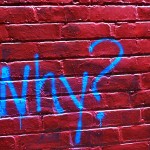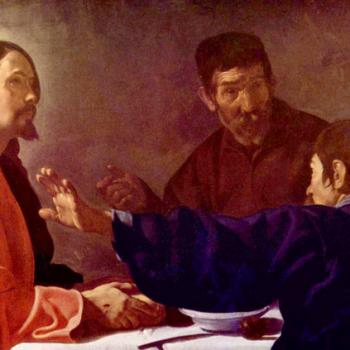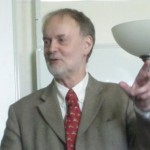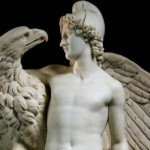Tour de Awesome
Blogsphere confessional: I have a total, complete, 100% man-crush on David Dark. From the time I first took in hand Everyday Apocalypse and read about the epiphany he experienced while watching Raising Arizona, I knew that I was in the presence of someone through whose eyes I wanted to see the world.
That snippet summarizes what I loved, cover to cover, in Dark’s latest book, Life’s Too Short to Pretend You’re Not Religious.
I would not call Dark a religionist so much as I would call him a cultural critic. But I wouldn’t call him a critic so much as I would call him a lover and, perhaps more to the point, an inveterate interpreter of culture.
It seems that everything upon which David Dark sets his eyes, or everything that reaches his ears simply explodes with the kind of meaning that most of us would strain to hear. To take up Life’s Too Short is be, in turn, taken by the hand and led through an exhilarating tour of the world we occupy together and what it tells us about ourselves.
Religious?
So now that you know how deeply my heart is stirred, I can now risk my single, pervasive, and agonizing critique of the book. It’s the word “religious.”
The title of the book might make you think that it’s a sort of apologetics book. Maybe the nice guy kind. But still. The kind of book that you’d read for the purpose of handing to your agnostic or atheist friend in hopes of getting them to see that they, too, are worshiping G/god in some form or another.
But the truth of the matter is that if there is any conversion to be had from this book’s pages it’s the conversion of the religious who think that their religious forms are the way in which true religion is practiced.
“Religion” in this book is about being enmeshed in relationships–with each other as much as anything else. It is about being perpetual meaning-making and story-telling creatures. 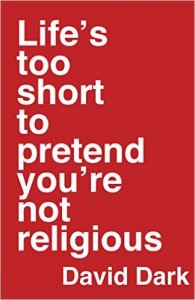
In other words, it’s not what most people mean by religious.
Which is all fine and good. It’s nice to have our categories subverted from time to time. But the insistence on naming as religion these things that most wouldn’t call religious is a significant liability. It has made me hesitate to recommend the book to the people with whom I would most like to discuss it–a few friends who are, like Dark, insatiable interpreters of the world but who, unlike Dark, no longer self-identify as religious in any significant sense.
Yes, I found myself thinking, “Life’s too short to pretend this book’s religious!”
For the Beauty
“I’m in it for the beauty.” That’s the heartbeat Dark ascribes to his work. He goes on to articulate a vision for life in which we do not use convictions to divide from other people, but instead cultivate convictions that all people are worth knowing:
As I see it, to refuse the possibility of finding another person interesting, complex and as complicated as oneself is a form of violence. At bottom, this is a refusal of nuance, and I wish to posit that nuance is sacred… nuance also delivers us out of the deadly habit of cutting people out of our own imaginations. This opens us up to the possibility of at least occasionally finding one another beautiful, the possibility of communion.
Can I get an “Amen”?
He also works with a category of narrative / story that resonates deeply with my own “storied theology” approach to scripture and to faith. Speaking of the Bible, Dark says,
Weirdly enough, committing myself to it, in spirit and in truth, means to hold fast to movement, to receptivity, to new and unforeseen goodness on the horizon, to what the Spirit of the Lord might be saying to us in our contemporary context.
Listening to scripture means entering the story as an on-going story that might still surprise.
It turns out that my admiration for Dark’s ability to notice meaning in everything is no accident. He talks about the importance, the centrality, of paying attention. What we choose to pay attention to shows who we are, what we are, as it bears its fruit in our lives. Be careful what you pay attention to.
Making Me a Better Human
I hate to make two confessions in one post, but… well… it’s that kind of day. So here goes: what I read doesn’t often make me a better person. Despite my academic credentials, I learn much better in relationships with real humans than through my books.
But Life’s Too Short to Pretend You’re Not Religious got under my skin. I paid attention to it. And it helped me.
Here’s the story: for a few months I had been needing to have a somewhat dreaded conversation. I am in the process of leaving my job at Fuller, and there are a few loose ends I really want to tie up (get those library books in, get coffee with that one colleague, clean out my office). One of these loose ends is a difficult conversation with someone.
So I finally did it. I reached out by email: Hey, can you let me know when you have 10 minutes for a phone call?
The reply came quickly: No.
No? Really? Are you kidding me?
I went from grief at the realization of the loss of a relationship that had deteriorated worse than I thought to raging bull mad. Oh, the number of email replies I wrote in my head!
But then, something happened. I was reading. I was reading LTSTPYNR and the streams crossed.
This person with whom I was angry is, also, human. A human who, like every other human, naturally takes the sides of his dear friends when they are in conflict. A human who, like every other human, wants to avoid confrontation. A human who, like most of us, prefers a veneer of peace even if it’s covering quite a tempest. A human who has a right to be forgiven without asking for it.
It turned out that there was something deeply religious in the “chothering” (“each other-ing”) that Dark was depicting as so beautiful and full of life. There was something as religious as the blessing of allowing another who had wronged me in some small way to be seen as fully human. There was something as religious as the blessing of forgiveness that turns its blessing back on the one who gives it–unasked for and even unknown.
So maybe my churlish grumpiness about the title needs to be revoked. Or maybe the call to see my fellow frail human was religious for me because I am so embedded in religious narratives myself.
Either way, my personal epiphany in the midst of conflict—an epiphany about humanity and beauty and listening and being related—confirmed for me forever: I want to keep seeing the world through the eyes of David Dark.

